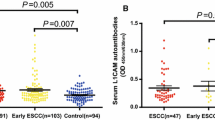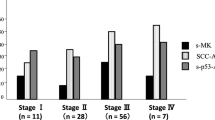Abstract
Background
Cofilin (CFL1, actin-binding protein) and β-actin (ACTB) are key molecules in the polymerization and depolymerization of actin microfilaments. The levels of these antibodies were analyzed, and the clinicopathological significance in patients with esophageal carcinoma were evaluated.
Methods
The levels of anti-CFL1 and anti-ACTB antibodies were analyzed in serum samples of patients with esophageal carcinoma and of healthy donors. Eighty-seven cases underwent radical surgery and the clinicopathological characteristics and prognosis was examined.
Results
Serum anti-CFL1 antibody (s-CFL1-Ab) levels and anti-ACTB antibody (s-ACTB-Ab) levels were significantly higher in patients with esophageal carcinoma than in healthy donors. Following the receiver operating characteristic curve analysis between healthy donors and esophageal carcinoma, the sensitivity and specificity for serum anti-CFL1 antibody (s-CFL1-Ab) were 53.3% and 68.8%. The sensitivity and specificity for serum anti-ACTB antibody (s-ACTB-Ab) were 54.9% and 67.7%, respectively. Univariate and multivariate analysis showed that s-CFL1-Ab and s-ACTB-Ab levels were not associated with sex, age, tumor depth, lymph node metastasis, or anti-p53-antibody levels. s-ACTB-Ab levels but not s-CFL1-Ab levels significantly correlated with squamous cell carcinoma antigen. Neither s-CFL1-Ab nor s-ACTB-Ab levels alone were obviously related to overall survival. However, patients with low s-CFL1-Ab levels and high s-ACTB-Ab levels exhibited significantly more unfavorable prognoses than those with high s-CFL1-Ab and low s-ACTB-Ab levels.
Conclusions
Serum levels of anti-CFL1 and anti-ACTB antibodies were significantly higher in patients with esophageal carcinoma than in healthy donors. A combination of low anti-CFL1 and high anti-ACTB antibodies is a poor prognostic factor in esophageal carcinoma.


Similar content being viewed by others
References
Shimada H, Nabeya Y, Okazumi S, et al. Prediction of survival with squamous cell carcinoma antigen in patients with resectable esophageal squamous cell carcinoma. Surgery. 2003. https://doi.org/10.1067/msy.2003.139.
Shimada H, Takeda A, Arima M, et al. Serum p53 antibody is a useful tumor marker in superficial esophageal squamous cell carcinoma. Cancer. 2000;89:1677–83.
Shiratori F, Ito M, Yajima S, et al. The effectiveness of serum midkine in detecting esophageal squamous cell carcinoma. Esophagus. 2019. https://doi.org/10.1007/s10388-019-00657-0.
Huang FY, Li YN, Mei WL, Mei WL, et al. Cytochalasin D, a tropical fungal metabolite, inhibits CT26 tumor growth and angiogenesis. Asian Pac J Trop Med. 2012. https://doi.org/10.1016/S1995-7645(12)60019-4.
Utomo DH, Fujieda A, Tanaka K, et al. The C29–C34 parts of antitumor macrolide aplyronine A serve as versatile actin-affinity tags. Chem Commun (Camb). 2021. https://doi.org/10.1039/d1cc04259a.
Bravo-Cordero JJ, Magalhaes MA, Eddy RJ, et al. Functions of cofilin in cell locomotion and invasion. Nat Rev Mol Cell Biol. 2013. https://doi.org/10.1038/nrm3609.
Sahin U, Tureci O, Schmitt H, et al. Human neoplasms elicit multiple specific immune responses in the autologous host. Proc Natl Acad Sci USA. 1995. https://doi.org/10.1073/pnas.92.25.11810.
Nakashima K, Shimada H, Ochiai T, et al. Serological identification of TROP2 by recombinant cDNA expression cloning using sera of patients with esophageal squamous cell carcinoma. Int J Cancer. 2004. https://doi.org/10.1002/ijc.20517.
Ito M, Hiwasa T, Oshima Y, et al. Identification of serum anti-striatin 4 antibodies as a common marker for esophageal cancer and other solid cancers. Mol Clin Oncol. 2021. https://doi.org/10.3892/mco.2021.2399.
Sumazaki M, Shimada H, Ito M, et al. Serum anti-LRPAP1 is a common biomarker for digestive organ cancers and atherosclerotic diseases. Cancer Sci. 2020. https://doi.org/10.1111/cas.14652.
Ito M, Hiwasa T, Oshima Y, et al. Association of serum anti-PCSK9 antibody levels with favorable postoperative prognosis in esophageal cancer. Front Oncol. 2021. https://doi.org/10.3389/fonc.2021.708039.
Sugimoto K, Mori M, Liu J, et al. Novel serum autoantibodies against β-actin (ACTB) in amyotrophic lateral sclerosis. Amyotroph Lateral Scler Frontotemporal Degener. 2021. https://doi.org/10.1080/21678421.2021.1885448.
Shimada H, Shiratori T, Yasuraoka M, et al. Identification of makorin 1 as a novel SEREX antigen of esophageal squamous cell carcinoma. BMC Cancer. 2009. https://doi.org/10.1186/1471-2407-9-232.
Machida T, Kubota M, Kobayashi E, et al. Identification of stroke-associated-antigens via screening of recombinant proteins from the human expression cDNA library (SEREX). J Transl Med. 2015. https://doi.org/10.1186/s12967-015-0393-4.
Online document; PerkinElmer. In: http://www.perkinelmer.com/lab-solutions/resources/docs/GDE_ELISA-to-AlphaLISA.pdf. Accessed Aug 2012.
Li SY, Yoshida Y, Kobayashi E, et al. Association between serum anti-ASXL2 antibody levels and acute ischemic stroke, acute myocardial infarction, diabetes mellitus, chronic kidney disease and digestive organ cancer, and their possible association with atherosclerosis and hypertension. Int J Mol Med. 2020. https://doi.org/10.3892/ijmm.2020.4690.
Shimada H, Ochiai T, Nomura F, Japan p53 Antibody Research Group. Titration of serum p53 antibodies in 1,085 patients with various types of malignant tumors: a multiinstitutional analysis by the Japan p53 Antibody Research Group. Cancer. 2003. https://doi.org/10.1002/cncr.11092.
Kanda Y. Investigation of the freely available easy-to-use software “EZR” for medical statistics. Bone Marrow Transplant. 2013. https://doi.org/10.1038/bmt.2012.244.
Broll R, Duchrow M, Oevermann E, et al. p53 autoantibodies in sera of patients with a colorectal cancer and their association to p53 protein concentration and p53 immunohistochemistry in tumor tissue. Int J Colorectal Dis. 2001. https://doi.org/10.1007/s003840000263.
Waxman S, Wurmbach E. De-regulation of common housekeeping genes in hepatocellular carcinoma. BMC Genomics. 2007. https://doi.org/10.1186/1471-2164-8-243.
Bunnell TM, Burbach BJ, Shimizu Y, et al. β-actin specifically controls cell growth, migration, and the G-actin pool. Mol Biol Cell. 2011. https://doi.org/10.1091/mbc.E11-06-0582.
Ruan W, Lai M. Actin, a reliable marker of internal control? Clin Chim Acta. 2007. https://doi.org/10.1016/j.cca.2007.07.003.
Nowak D, Krawczenko A, Dus D, et al. Actin in human colon adenocarcinoma cells with different metastatic potential. Acta Biochim Pol. 2002;49:823–8.
Wang WS, Zhong HJ, Xiao DW, et al. The expression of CFL1 and N-WASP in esophageal squamous cell carcinoma and its correlation with clinicopathological features. Dis Esophagus. 2010. https://doi.org/10.1111/j.1442-2050.2009.01035.x.
Sinha P, Hutter G, Kottgen E, et al. Increased expression of epidermal fatty acid binding protein, cofilin, and 14–3-3-sigma (stratifin) detected by two-dimensional gel electrophoresis, mass spectrometry and micro sequencing of drug-resistant human adenocarcinoma of the pancreas. Electrophoresis. 1999. https://doi.org/10.1002/(SICI)1522-2683(19991001)20:14%3c2952::AID-ELPS2952%3e3.0.CO;2-H.
Tang Q, Ji Q, Tang Y, et al. Mitochondrial translocation of cofilin-1 promotes apoptosis of gastric cancer BGC-823 cells induced by ursolic acid. Tumour Biol. 2014. https://doi.org/10.1007/s13277-013-1325-7.
Yang ZL, Miao X, Xiong L, et al. CFL1 and Arp3 are biomarkers for metastasis and poor prognosis of squamous cell/adenosquamous carcinomas and adenocarcinomas of gallbladder. Cancer Investig. 2013. https://doi.org/10.3109/07357907.2012.756113.
Naicker SD, Feerick CL, Lynch K, et al. Cyclophosphamide alters the tumor cell secretome to potentiate the anti-myeloma activity of daratumumab through augmentation of macrophage-mediated antibody dependent cellular phagocytosis. Oncoimmunology. 2021. https://doi.org/10.1080/2162402X.2020.1859263.
Xie L, Li LY, Zheng D, et al. F806 suppresses the invasion and metastasis of esophageal squamous cell carcinoma via downregulating F-actin assembly-related Rho family proteins. Biomed Res Int. 2018. https://doi.org/10.1155/2018/2049313.
Holzinger A. Influencing the actin dynamics in plant cells by jasplakinolide, chondramides, phalloidin, cytochalasins, and latrunculins. Methods Mol Biol. 2022. https://doi.org/10.1007/978-1-0716-1661-1_9.
Acknowledgements
We thank professor Kimihiko Funahashi, MD., PhD. for supporting our study. And we also thank Ms. Seiko Otsuka, Ms. Masae Suzuki, Ms. Chiho Kusaka, and Ms. Satoko Ishibashi for preparing patient data.
Funding
This research was supported by the Project for Cancer Research and Therapeutic Evolution (P-CREATE) from the Japan Agency for Medical Research and Development, AMED (grant no. 21cm0106403h0006) and Grants-in-Aid for Scientific Research (KAKENHI) from the Japan Society for the Promotion of Science, JSPS (grant no. 16K10520 and 20K16396).
Author information
Authors and Affiliations
Contributions
TH, HS, YI, and MI did conceptualization; SYL, KS, MM, and SK did methodology; SYL validated the study; YO, SY, TS, TN, FS, and HT did data curation; MI, TH, and HS wrote the manuscript; HS did funding acquisition. All authors have read and agreed to the published version of the manuscript.
Corresponding author
Ethics declarations
Ethical statement
The study was conducted according to the guidelines of the Declaration of Helsinki and approved by the Ethics Committee of Toho University, Graduate School of Medicine (No. A18103_A17052_A16035_A16001_26095_25024_24038_22047_22047) and Chiba University Graduate School of Medicine (No. 2018-320) (Japan) and co-operated hospitals. We collected sera from patients who had provided written informed consent.
Conflict of interest
The authors declare no conflict of interest.
Additional information
Publisher's Note
Springer Nature remains neutral with regard to jurisdictional claims in published maps and institutional affiliations.
Supplementary Information
Below is the link to the electronic supplementary material.
10388_2022_939_MOESM1_ESM.docx
Supplementary file1 (DOCX 52 kb) Comparison of serum anti-ACTB antibody (s-ACTB-Ab) and serum anti-CFL1 antibody (s-CFL1-Ab) levels between solid cancers and healthy donors. The levels of s-CFL1-Abs and s-ACTB-Abs in healthy donors (n = 96) and patients with gastric cancer (n = 96) and colorectal cancer (n = 192) were examined by AlphaLISA and are shown in box-whisker plots. The serum samples were collected before treatment including all pathological stages. Treatment methods were not limited to surgery. Box plot represents 25, 50 and 75 percentiles. The upper and lower horizontal lines represent 90 and 10 percentiles, respectively. ***, P <0.001; **, P <0.01, *, P <0.05; evaluated with the Kruskal–Wallis test with Bonferroni’s correction applied
Rights and permissions
About this article
Cite this article
Ito, M., Hiwasa, T., Yajima, S. et al. Low anti-CFL1 antibody with high anti-ACTB antibody is a poor prognostic factor in esophageal squamous cell carcinoma. Esophagus 19, 617–625 (2022). https://doi.org/10.1007/s10388-022-00939-0
Received:
Accepted:
Published:
Issue Date:
DOI: https://doi.org/10.1007/s10388-022-00939-0




